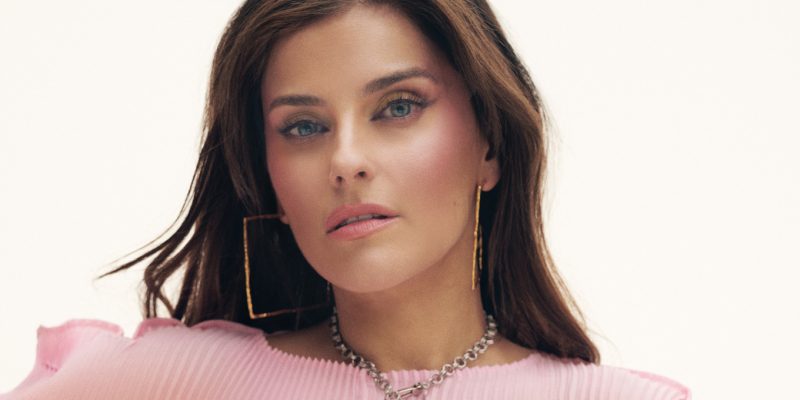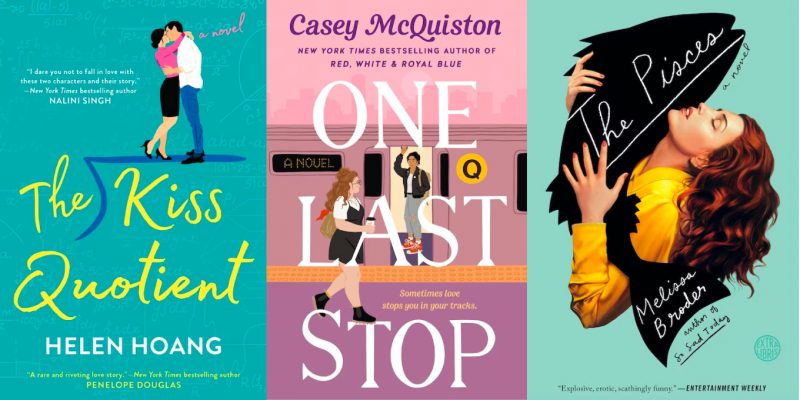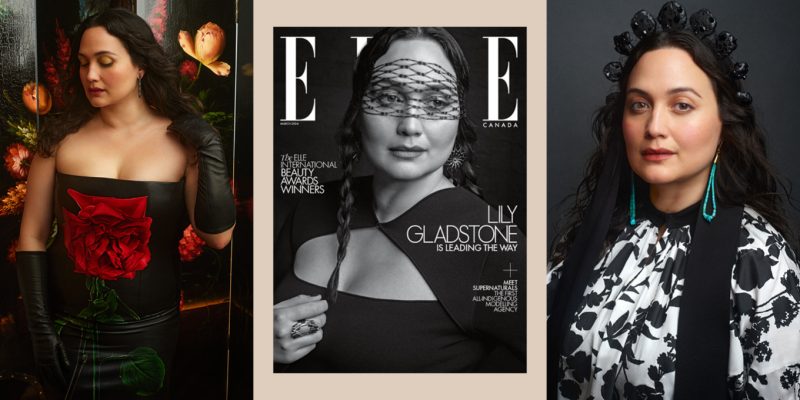Society
Sienna Miller Has Finally Found Freedom in Her Life
Miller—who stars in Netflix's new drama Anatomy of a Scandal—tells Terri White how she survived the toxic 2000s culture, took control of her life and found freedom at 40.
by : Terri White- May 13th, 2022
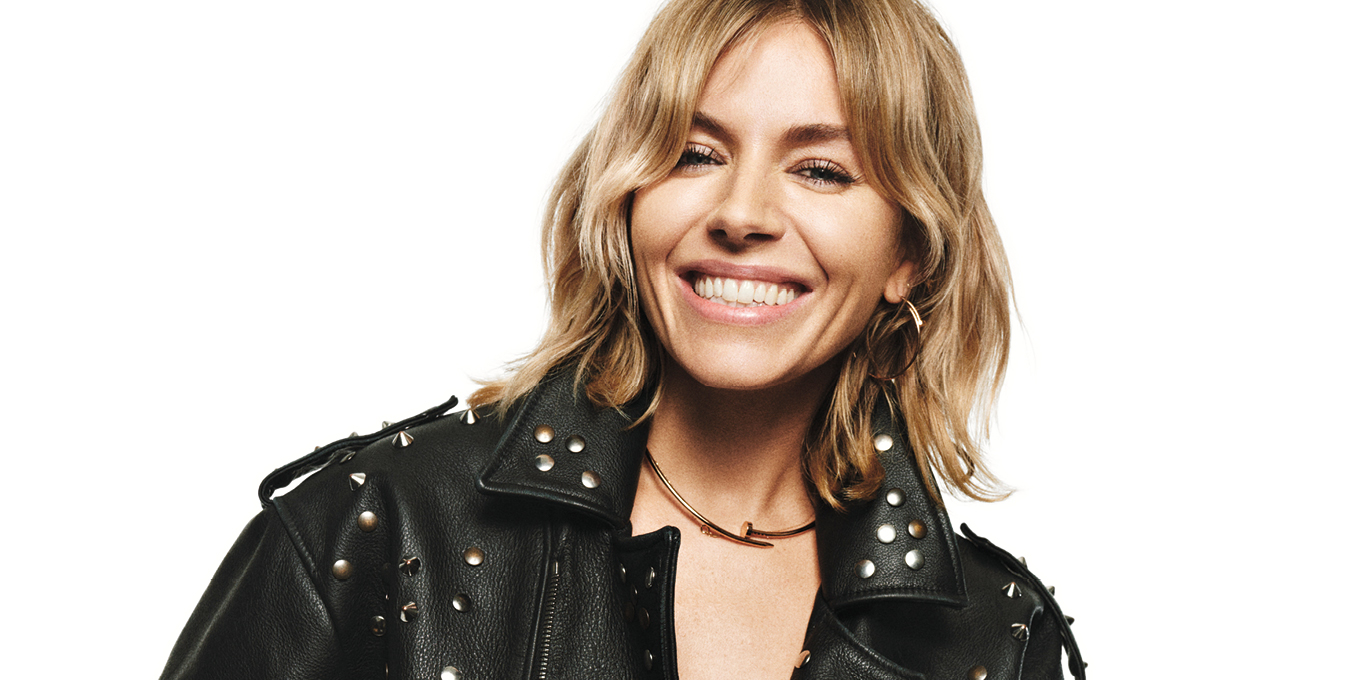
TOM SCHIRMACHER
Sienna Miller is telling me about a dream she had a few years ago. “I was at a carnival,” she begins. “And one of the rides, or experiences, was a jar of chocolate-covered raisins. Each one was one of my memories, and people could go and suck the chocolate off and just leave the raisin.” She pauses and looks at me. “That’s pretty trippy,” I say. She nods. “It sums up absolutely everything about what I was experiencing—[I felt like] nothing belonged to me at all.”
We’re only minutes into our conversation at a hotel bar in central London, England, but we are already deconstructing the actor’s trauma-inspired dreams. This, I discover after two meetings, is how it goes with Sienna Miller. She can’t help but go deep, even when she isn’t sure if she should.
Our first meeting almost didn’t happen. The night before, Storm Franklin had struck the U.K. It was brief and brutal—trees were wrenched up by their roots, and riverbanks burst. But by the time I meet Miller, the storm has passed. She bounds through the door in a white T-shirt, weathered blue jeans and layered gold jewellery. Her hair is pulled back in a messy bun, and her skin is so clean it could squeak. At a glance, it could be 2003 again, when 21-year-old Miller was in every magazine and newspaper, headlining every celebrity-style page—and this was before her first big film roles. (Layer Cake and Alfie were both released in 2004.) After an early career as a model and having had a few small TV parts, Miller fell in love with her Alfie co-star (and very famous man) Jude Law—and subsequently fell into fame.
And that’s the other thing with Sienna Miller: As much as she is focused on her life today as a 40-yearold mother to nine-year-old Marlowe and as an actor with two decades of work behind her, our conversation is inexorably tugged back into the past. In the early 2000s, a period of insane celebrity-tabloid culture, a very different kind of storm raged—one that was not as brief but was just as brutal. It’s a period of her life she calls “frenzied,” a time when she “couldn’t see a way out of anything; [it was] just one foot in front of the other.”
One of the reasons this era is at the surface again is Miller’s latest project: Netflix’s adaptation of Sarah Vaughan’s hit novel Anatomy of a Scandal. Miller plays Sophie Whitehouse, an MP’s wife whose world is upended after her husband, James (Rupert Friend), is accused of rape by a colleague with whom he’d had an affair. The six-part series couldn’t be more timely; it deals not only with consent but also the toxic privilege that so many people in politics have. But more than that, it’s a (painfully) perfect vehicle for Miller, who also saw her private life become overwhelmingly public. She says the most interesting thing about her character is that it was familiar terrain. “I’ve experienced some of the things that she experiences,” she says. “The feelings were familiar. [But] her way of dealing with what’s thrown at her is the absolute antithesis of what my way is. And so, in a kind of twisted-tourism sense, I wanted to see how it would feel to react differently. I know that sounds weird—you’d think it would be deeply unpleasant to sit in that space.”
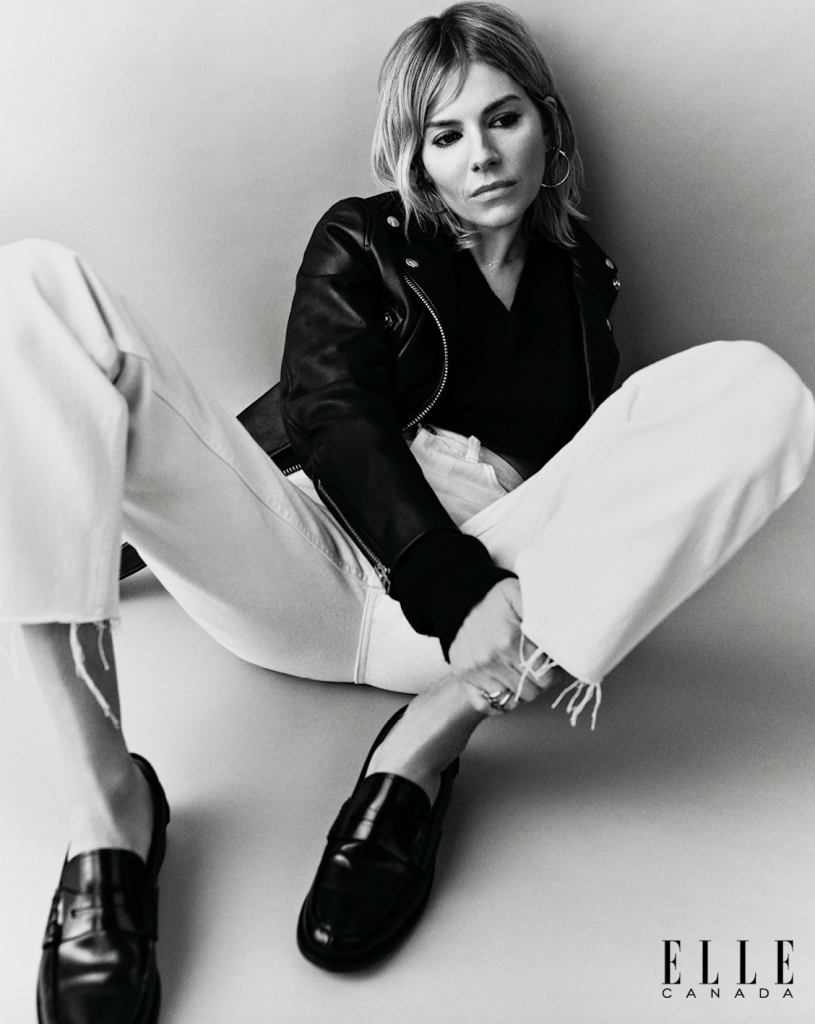 Jacket (Acne Studios), sweater (Miu Miu), jeans (Re/Done), loafers (Church’s) and earrings and rings (Cartier)
Jacket (Acne Studios), sweater (Miu Miu), jeans (Re/Done), loafers (Church’s) and earrings and rings (Cartier)Miller recounts what happened when they filmed the scene in which James confesses the affair to Sophie: “I had a mic on my chest, and [in the show] there’s a heartbeat that comes in—it was my actual heartbeat, getting faster and faster, being picked up by the monitor.” It may have been unintended, but it was ultimately (and unsurprisingly) kept in. “It made me think, remember and put myself back in that position. I really must need help if this is what I enjoy doing!” she adds with a laugh.
Looking back, Miller is still almost in disbelief about her entire 20s. Like so many other very young, very famous women in both the U.K. and the U.S., she spent 10 years in the full glare of the tabloids, her privacy dismissed as a privilege she didn’t deserve. Paparazzi followed her in cars and chased her on foot, and they would spit at her and call her names to elicit a reaction because those pictures would sell for more money.
“It feels like somebody else’s existence,” she says, still seeming a little dazed. “I can go and visit it and look at it, but it doesn’t feel like my life. I can’t quite believe that it all happened. And not to put it specifically on that one thing, but the chaos of that entire decade is so far removed from my life now.”
There is a moment in Anatomy of a Scandal that, knowing what we know about Miller’s paparazzi hell, I found difficult to watch: when she and Friend have to push their way through a crowd of baying photographers. “Rupert had also experienced it, so those scenes weren’t pleasant for either of us,” she says. “But it was weirdly interesting to kind of step back in and…” She grapples for the right word. “There is something cathartic, I suppose, about spending time in an ugly space that’s familiar—and maybe reclaiming it. I don’t know what the psychology of it is, but there is something where maybe you can substitute a memory with something else.” Well, I say, it’s a safe, controlled environment. And surely it’s about consent: taking control of something she had no control over—or could consent to—back then. She nods along.
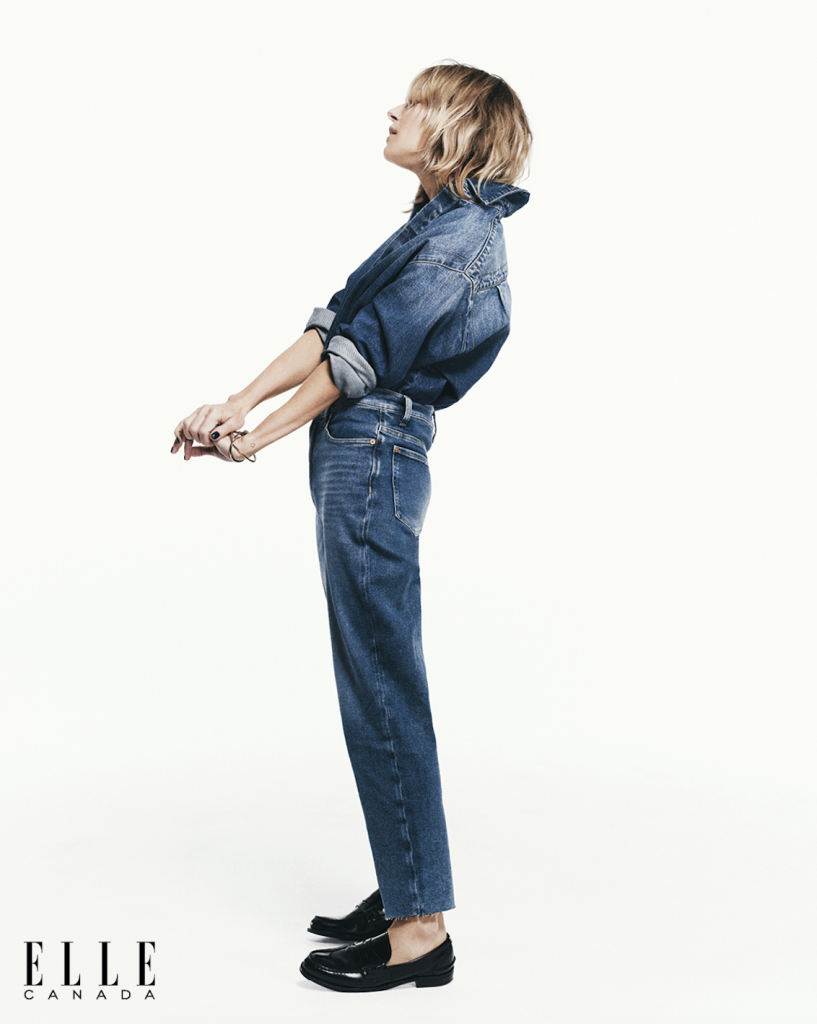 Top (Alaia, at Mytheresa), jeans (7 for All Mankind), loafers (Church’s) and bracelets (Cartier)
Top (Alaia, at Mytheresa), jeans (7 for All Mankind), loafers (Church’s) and bracelets (Cartier)Fame for Miller—who was born in America and moved to London as a baby—happened overnight. “I was just catapulted into a totally parallel universe while being in love [with Law],” she says. “There was a lot of magic at that time. At first, it was kind of comical, but it very quickly became insidious and, yeah, scary. And my boyfriend [at the time] had been experiencing it for years and felt, understandably, a lot of hostility about that kind of attention. So my initial reaction was the same.”
It wasn’t sustainable, though, and Miller surprised everyone—not least herself, I sense—when she decided to do something about it. “I became so litigious just to try to carve out an existence that I could manage,” she says. “We’ve seen women implode as a result of that [attention]. You can’t hold on to sanity or stay grounded.” In 2008, Miller sued the worst-offending paparazzi agency for harassment and won an injunction against future breaches of her privacy. That same year, she sued (and reached out-of- court settlements with) The Sun and News of the World, also for invasion of privacy. And in 2011, she settled with News of the World for damages related to phone hacking and testified—defiantly, honestly—about the impact the paparazzi had had on her life and relationships at the Leveson Inquiry later that same year.
The world today is a radically different place. Tabloid newspapers are no longer a dominant force. Social media has given the famous a direct line to the world, a way to call out published lies. And the paparazzo packs have diminished in size and ferocity. It’s clear Miller knows that she effected change in her own life—there are never guys with long lenses outside her house anymore—but it seems she doesn’t realize the impact she had on the wider culture. Her commitment to accountability and change arguably led to a marked difference in how all women in the public eye are treated.
“I don't know what more I have to do. I feel like I've proven myself from a young age. ”
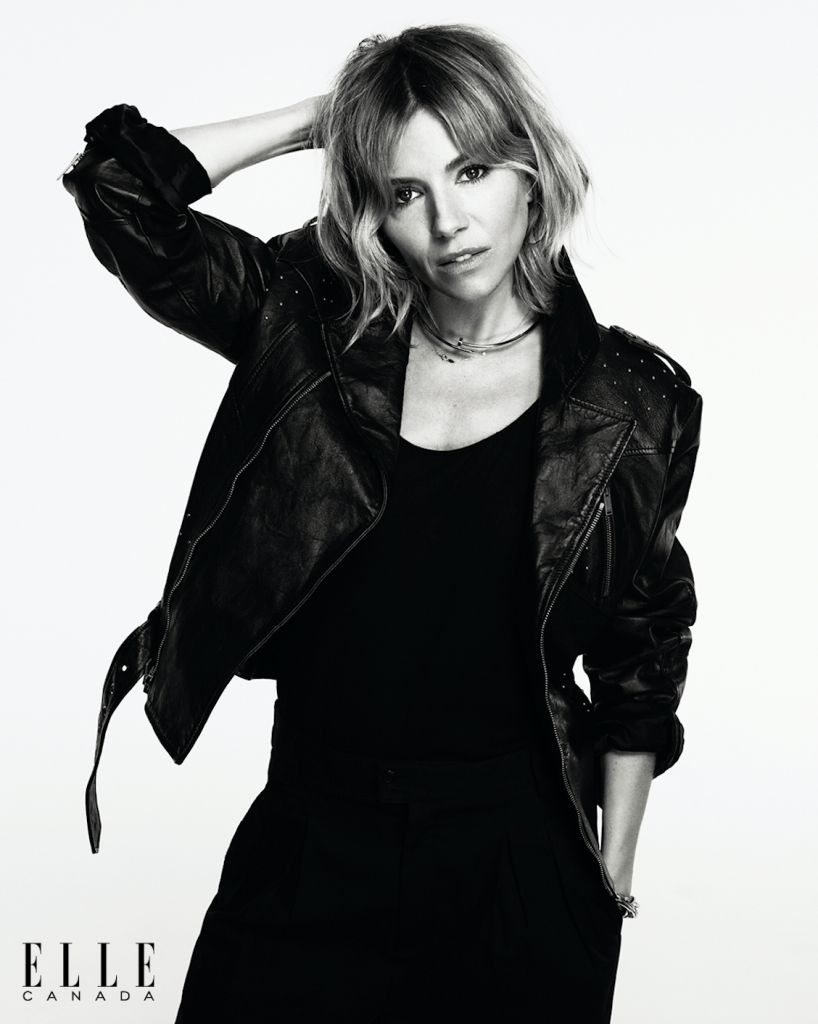 Jacket, top and trousers (Saint Laurent by Anthony Vaccarello) and earrings, necklace and bracelets (Cartier)
Jacket, top and trousers (Saint Laurent by Anthony Vaccarello) and earrings, necklace and bracelets (Cartier)What this breathing space and receding of attention allowed to come to the fore for Miller was her work. Aside from her daughter, it’s what she is most passionate about. Despite that, she has had to spend many years trying to disprove the preconceptions that are often still attached to actors who happen to be incredibly beautiful, especially if they show more than a passing interest in fashion—and Miller not only launched a fashion line with her sister, Savannah, but she also fronted campaigns for Burberry, Tod’s, Boss and Gucci.
Many journalists have described her as a “fashionista” before “actress.” (And some still do.) They express surprise at a fantastic Sienna Miller performance even though she’s been quietly, fastidiously turning them out for several years now: Foxcatcher, American Sniper, High-Rise, American Woman.
This constant underestimation is bizarre critical amnesia, which I can only assume must be really, really irritating. “I don’t know what more I have to do,” she says with a shrug. “I feel like I’ve proven myself from a young age. [I don’t want that to] sound arrogant, because I’m riddled with insecurity and the lowest self-esteem. And that’s the truth—I’m not just saying it. But I think I’ve reached a point of nihilism, which I’m quite happy about. I don’t know whether that’s [because of] COVID, but I just don’t really care. I do just wish that people would be a bit more original in their thoughts.”
COVID as a priority sharpener aside, Miller also turned 40 in December. She had a small lunch at her cottage in the U.K. after the original planned party had to be cancelled due to the spread of the Omicron variant. She is relieved to have left behind not just her 20s but her 30s too, sharing that she felt “pressure… [about] kids and whether I should have more and why I haven’t and all that, which is really loud noise. Biology is incredibly cruel to women in that decade—it’s the headline, or it certainly was for me. Then I got to 40, and I froze some eggs. Having been really focused on the need to have another baby, [now] I’m just like ‘If it happens, it happens.’ That kind of existential threat has dissipated.”
Miller is coming to the end of a stay in London and moving back to New York. She recently realized a longheld dream and bought a place there for herself and Marlowe, whom she co-parents with her ex, actor Tom Sturridge. She describes herself as “happy,” and, quite honestly, it radiates from her. For all the intensity and candour of our conversation, she is absolutely cracking company—warm, curious and funny.
We speak for a second time later the same week—she’s back across the Atlantic in her new home; it needs some work, having not been redecorated since (she reckons) the 1970s. “I kind of love that it’s this rambling, decaying, untouched thing,” says Miller.
“It feels like somebody else's existence. I can go and visit it and look at it, but it doesn't feel like my life. I can't quite believe that it all happened. ”
She shares a worry she has about our first conversation. “I was so oversharing with you the other day,” she groans. “I don’t know what happened!” I tell her not to be daft, but at the same time I wonder at how tricky this all must be for her. She’s someone who is naturally both introspective and incredibly open but has lived a life that has taught her to shut the door—or, at least, leave it only slightly ajar.
This time, we talk a little more about her career: the work she’s most proud of (2018’s American Woman, unsurprisingly—it’s a tour de force from Miller, and it’s criminal that it didn’t appear in the awards race); her one and only turn in a big commercial blockbuster, GI Joe: The Rise of Cobra, in 2009 (“It wasn’t the right vehicle for me—it wasn’t a world I was interested in, and it wasn’t a character I could understand or relate to. It was a hard thing to go and support because I thought it was pretty shit”); and her upcoming projects (Raised Eyebrows, a film about Groucho Marx, and Kristin Scott Thomas’ directorial debut, The Sea Change). She talks about wanting to produce in the future and possibly direct. She’d likely be brilliant at both.
But we circle back again to taking on the tabloids; it’s only been a matter of weeks since she settled claims against The Sun for “substantial damages” on a no-admission- of-liability basis. “Making that decision to take on Murdoch[’s company]… it was a really difficult choice to make,” she says of her long road to something approaching justice. And the legal battles, though hard, were key to Miller starting to regain control of her life. “Once you start to challenge it legally and have minor victories, it does feel like, to some degree, you’re reclaiming a narrative or a part of yourself that was taken,” she says. “And that’s empowering. That feels good.”
It’s kind of incredible that through it all, Miller—even when she felt like one of those chocolate-covered raisins in her mad dream—clung to who she was and didn’t get lost in the persona others had created for her. “I was the same person then as I am now,” she insists, crediting “solid family and friends” for that.
Now that the action against The Sun has been resolved, it represents something of a line drawn under that time in Miller’s life. “It’s something I survived,” she says with emphasis. “It feels like the stakes were high at moments, and so I’m proud of that.” She suddenly looks a little sad. “And I would love to not revisit it, but it’s a huge part of my life and story.”
Life now is firmly chaos-free. She gets up at 6:20 a.m. every day, wakes Marlowe up, eats breakfast with her, gets her on the school bus and takes the dogs to the park. She then works—reading scripts, developing her skincare line, reading books for future projects—and sometime has lunch with a friend, and then she picks Marlowe up at 3:15 p.m. Later, she makes dinner. “You know, it’s really banal at the moment,” Miller says, laughing.
“There is something cathartic, I suppose, about spending time in an ugly space that's familiar—and maybe reclaiming it. ”
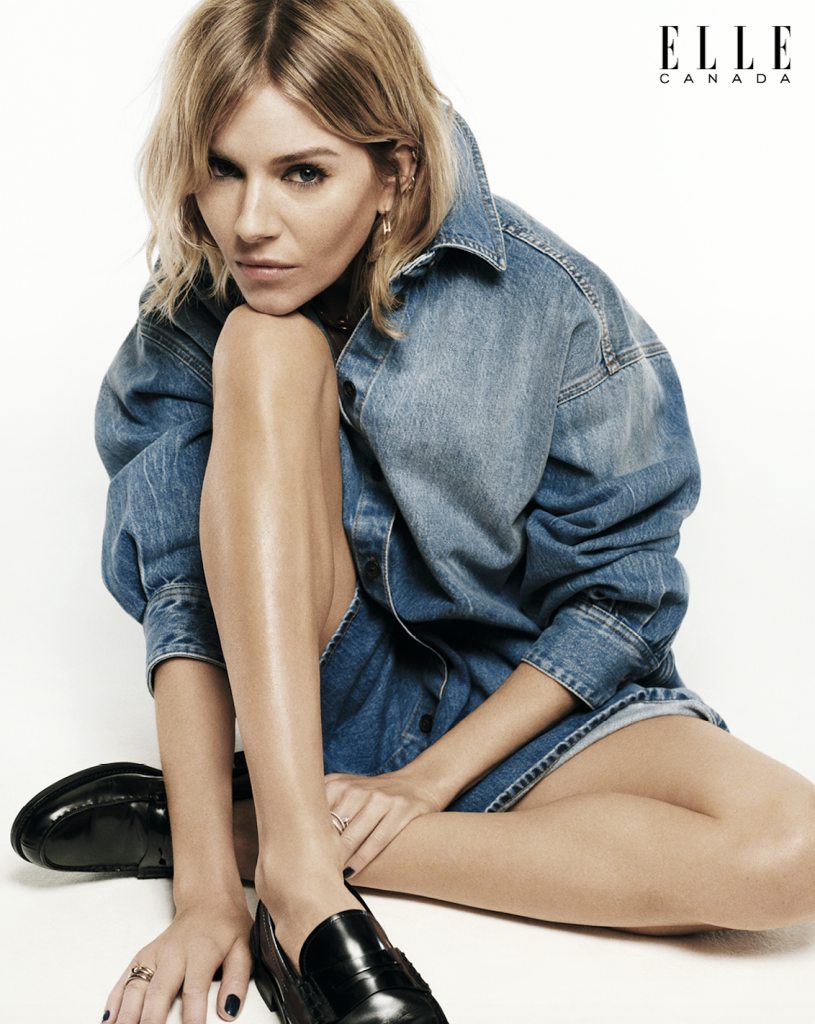 Shirt (The Row), loafers (Church’s) and earrings and rings (Cartier)
Shirt (The Row), loafers (Church’s) and earrings and rings (Cartier)“And then it’s really exciting!” I tell her it sounds lovely—and as though it couldn’t be further from the world that once threatened to pull her under. “I like the tranquility of it,” she confirms. “There’s just much less anxiety—for no specific reason other than, maybe, turning 40 and surrendering to being on some sort of life journey that is completely irrelevant. I think I know what matters to me: my friendships, my child and, ultimately, trying to be happy. That really is enough, [along] with some bursts of intensity and creativity—and, you know, way too much fun still at times. But I feel more in control of my life, and that’s really, really relieving.”
It doesn’t surprise me one bit to hear that too much fun is still very much on the menu in Miller’s life. Some women have a spark; she has a fire. And what of love, the thing that in some ways began this whole crazy journey when she was a 21-year-old who happened to fall for someone? “I love love more than anything,” she says without hesitation. “That’s the most important thing to me, and it always will be. So, in spite of whatever ups and downs I’ve had—many joyful and many extremely painful—I feel pathologically optimistic about my ability to give and receive love.” She stops herself; she seems unsure of how much more to reveal about who, if anyone, might be receiving it.
This is how it is with Sienna Miller. But now the decision, the control, is hers. It—and she—belongs to nobody else.
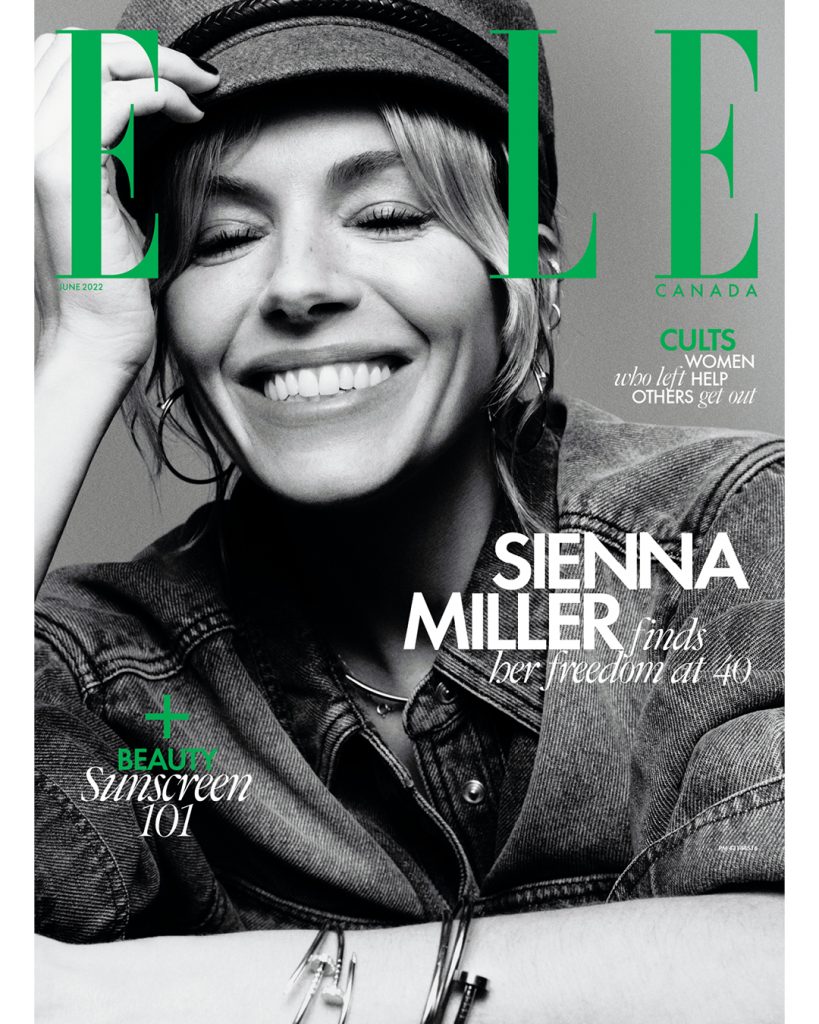 TOM SCHIRMACHER
TOM SCHIRMACHERFind the full story in the June 2022 issue of ELLE Canada — out on newsstands and on Apple News+ May 16. You can also subscribe for the latest in fashion, beauty and culture.
Newsletter
Join our mailing list for the latest and biggest in fashion trends, beauty, culture and celebrity.
Read Next

Fashion
Are Fashion Brands Getting Greener?
While the fashion industry is making a lot of noise about being more sustainable, a closer look shows that its earth-friendly commitments are often more illusion than reality.
by : Marouchka Franjulien- Apr 19th, 2024

Beauty
What Beauty Packaging Is Actually Sustainable?
We sought out leaders in the field to help us get to the bottom of the blue bin once and for all.
by : Victoria Christie- Apr 19th, 2024
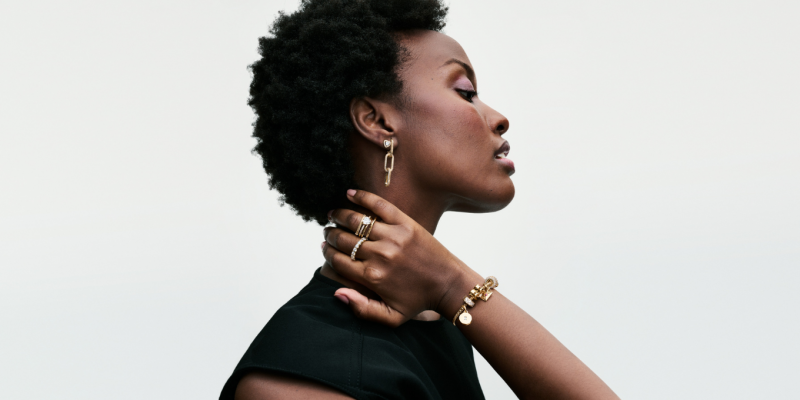
Fashion
This Jewellery Brand Has a Whole New Look And It’s Everything
Here are the seven pieces we’re coveting.
by : ELLE Canada- Apr 10th, 2024

